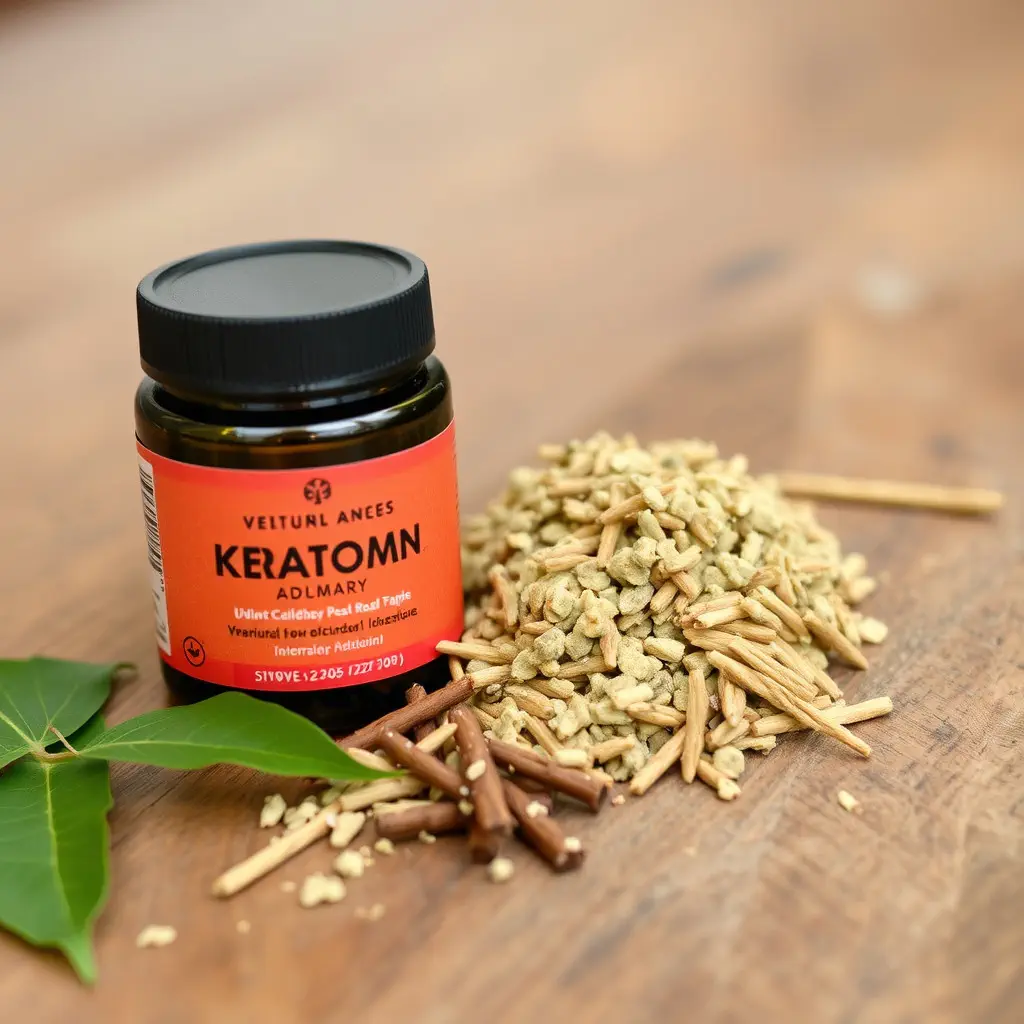Kratom, derived from the Mitragyna speciosa tree, has gained attention for its anxiolytic and mood-enhancing properties. As of 2023, kratom's legal status in Michigan is not explicitly controlled at the state level, making it legally accessible within the state under the Michigan Public Health Code. However, this could change with ongoing legislative proposals, so individuals must stay informed about local laws. The active compounds mitragynine and 7-hydroxymitragynine engage with brain receptors related to mood and stress response. Users interested in kratom for stress management are advised to consult healthcare professionals due to potential side effects, health risks associated with product quality, and the importance of following safe dosage guidelines. It's crucial to be aware that the legal status of kratom is subject to change and varies across different states and countries. Always verify the current legality of kratom in your area before use, and ensure you source high-quality, lab-tested products to avoid contamination or mislabeling.
Exploring the therapeutic potential of kratom as a natural remedy for stress and anxiety, this article delves into its role within the legal frameworks of Michigan. With a focus on understanding kratom’s mechanisms, we provide insight into how it can aid in managing these conditions. We also navigate the complexities surrounding its legality in the state, offering guidance on its responsible use as a supplement. Discover how kratom might offer a pathway to tranquility for those seeking alternatives to traditional methods. Is kratom legal in Michigan? We clarify this and more, ensuring readers are well-informed on this emerging topic.
- Understanding Kratom's Role in Stress and Anxiety Management: An Overview of Its Legal Status in Michigan
- The Science Behind Kratom: How It Can Help Reduce Stress and Anxiety Levels Legally in Michigan
- Navigating the Legal Landscape: Is Kratom Legal in Michigan? Guidelines and Best Practices for Use as a Supplement
Understanding Kratom's Role in Stress and Anxiety Management: An Overview of Its Legal Status in Michigan

Kratom, a plant native to Southeast Asia, has garnered attention for its potential role in managing stress and anxiety. Mitragyna speciosa, commonly known as kratom, contains compounds that may interact with the brain’s receptors, influencing mood and pain perception. As individuals seek natural alternatives to traditional pharmaceuticals, kratom has emerged as a supplement of interest for its anxiolytic and sedative effects, which can be beneficial in reducing feelings of anxiety and stress. However, it is crucial to approach its use with caution, adhering to recommended dosages and considering potential side effects, as the understanding of its long-term impact on health remains an area of ongoing research.
In terms of its legal status, kratom’s legality varies across different regions within the United States. In Michigan, the regulatory landscape is subject to change, reflecting a broader national debate on the substance. As of the knowledge cutoff date in 2023, kratom is not explicitly listed as a controlled substance under Michigan’s Public Health Code. This means that, within the state, kratom is legal and accessible to consumers. However, it is important for individuals to stay informed, as legislative proposals or changes could impact its status. Users are advised to comply with local laws and regulations, and consult with healthcare professionals before incorporating kratom into their wellness routines, especially if they are taking other medications or have pre-existing health conditions.
The Science Behind Kratom: How It Can Help Reduce Stress and Anxiety Levels Legally in Michigan

Kratom, a naturally occurring substance derived from the leaves of the Mitragyna speciosa tree, has garnered attention for its potential to alleviate stress and anxiety. The effects of kratom are attributed to its active compounds, principally mitragynine and 7-hydroxymitragynine, which interact with various receptors in the brain. These interactions can modulate neurotransmitter systems, such as serotonin and dopamine, which play a significant role in mood regulation and stress responses. Scientific research suggests that kratom may exert anxiolytic (anxiety-reducing) effects and provide a sense of well-being for some individuals.
In the context of legal considerations, it’s important to understand the status of kratom in Michigan. As of the knowledge cutoff date, kratom is legal at the federal level, and Michigan has not banned its sale or possession, provided it does not contain any adulterants or contaminants. This legal status allows consumers in Michigan to legally access kratom supplements as a means to help manage stress and anxiety levels. However, regulations can change, and it’s advisable for individuals to verify the current legal status of kratom in their locale before use. Users should also be aware of the potential side effects and ensure they are sourcing high-quality, tested products from reputable vendors to avoid health risks associated with contaminated or improperly formulated kratom products.
Navigating the Legal Landscape: Is Kratom Legal in Michigan? Guidelines and Best Practices for Use as a Supplement

When considering the use of kratom as a supplement for stress and anxiety management, it’s crucial to first understand the legal status of this botanical in your region. In Michigan, the legal landscape regarding kratom is subject to state laws which may differ from federal guidelines. As of the knowledge cutoff date, kratom is not explicitly classified as a controlled substance at the federal level, but its future remains uncertain due to ongoing evaluations by the Drug Enforcement Administration (DEA). At the state level, Michigan has specific regulations in place. It’s imperative to verify current local laws and statutes, as they can change; consult official state resources or legal counsel for the most accurate and up-to-date information.
For those in Michigan considering kratom as a supplement, it’s essential to adhere to guidelines and best practices to ensure safe use. Primary among these is sourcing high-quality, lab-tested products from reputable vendors to avoid adulterated or mislabeled items. Dosage should be carefully followed, aligning with recommended guidelines, and individuals should start with lower doses to gauge effects. Regular use should be monitored for signs of tolerance or dependence, and professional medical advice should be sought before incorporating kratom into a wellness regimen, especially if you have existing health conditions or are taking other medications. Always prioritize your health and safety over any supplement, and stay informed on the evolving legal status of kratom in your jurisdiction.
In conclusion, kratom offers a promising avenue for individuals in Michigan seeking natural supplements to manage stress and anxiety. The scientific evidence supporting its potential as a stress and anxiety reliever, coupled with clear guidelines on its legal status, provides a foundation for those interested in exploring this option responsibly. It’s crucial to adhere to the regulations governing kratom’s use within the state to ensure safety and efficacy. For those considering kratom as part of their wellness routine, understanding both its scientific backing and legal framework is essential. As with any supplement, consultation with healthcare professionals is recommended to align with personal health needs and ensure the best possible outcomes.






